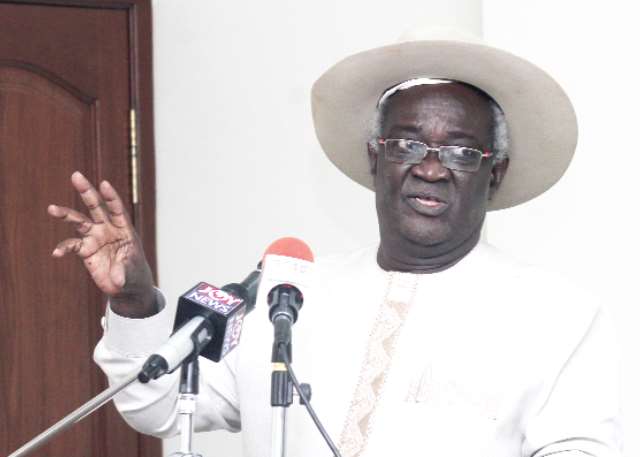Ghana’s longest serving Minister for Local Government and Rural Development, Prof Kwamena Ahwoi, has broken his silence on the on-going plans to elect the next Metropolitan, Municipal and District Chief Executive (MMDCEs).
The idea of electing Chief Executives at the local level has been on the discussion table for some time now. Under former President Akufo-Addo, the administration was on the verge of in making it happen on partisan basis but the opposition then objected to the idea.
Years on, the National Democratic Congress (NDC) is now in power and President John Dramani Mahama, after nominating his new MMDCEs indicated that, they may likely be the last batch to be chosen by the president.
A definite decision, he said, will be made after the Constitutional Review Committee presents its final report.
“The Constitutional Review Committee is travelling around the country and will present its recommendations in August this year. One of the major items that has come up is the election of MMDCEs. There is no doubt that Ghanaians want the MMDCEs elected.
Those who succeed you might have to go through elections”, he said while addressing MMDCEs at an orientation and training workshop on June 18, 2025 in Accra.
The governing party however still stands by its position that the election be done devoid of partisanship.
According to an Institute of Economic Affairs (IEA) survey, 67.9 percent oF Ghanaians prefer MMDCEs election with 63.5 preferring election on non-partisan basis.
But the experienced local governance expert, says he is against the entire plan because in his view, electing Chief Executive will not solve the so called problems the system have
Instead, he is suggesting that, in the time being the status quo remains until it becomes very necessary to try something else.
Speaking at a two-day ‘national dialogue on decentralization and responsive governance’ organized by the Inter-Ministerial Coordinating Committee on Decentralization (IMCCD) under the auspices of the presidency, in Accra, Prof Ahwoi wondered why the discuss for change when the current system has worked over the years, stressing there is no point fixing what has not broken.
He insists the current system has helped in extending developments to the local level without partisan interests.
Citing the violence that often characterizes national elections to advance his position, the former minister under late president Jerry John Rawlings, he said those acrimonious records be not extended to the local level.
“For now, I will recommend that the Local Government system should remain non-partisan. It has worked for now in the fourth republic and we should do everything to avoid at the local level the extreme polarization and violence that have afflicted our national level governance architecture. It has also enabled us to pursue local level development devoid of partisan consideration”, he said as the main speaker.
He also advised that the MMDCEs continued to be in the current hybrid form `.
“I am also of the view that, the MMDCAs should continue to be a hybrid of elected and appointed members even though there appears to be a case for removing the appointment power from the President and resting it in the chiefs and traditional authorities as was the case in the pre-1988 local government system.
The current system, under which the President appoints the 30 percent of the membership of the MMDAs, have the effect of loading the assemblies with partisan representatives of the president’s party and therefore detracting from the supposed non-partisanship of the assemblies.
Even though public opinion seems to be overwhelmingly in favour of the election of MMDCEs, I am of the view that as long as the current governance architecture of the country remains one of partisan central government, superimposed on a non-partisan local government system, with the partisan central government required to implement, it plans and programmes through non-partisan local government, the current situation of MMDCEs appointed by the president with prior approval of the MMDCEs should remain.
That architecture requires that the president has an important voice in the corridors of the MMDCEs.”
By Gifty Boateng


